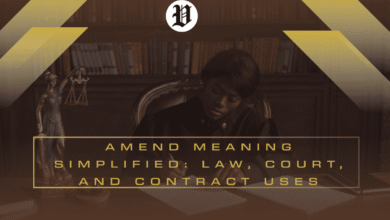Nevada & Las Vegas Marriage Annulment: Laws, Requirements, and Time Limits

The champagne bubbles have gone flat. The glitter from your Elvis-themed wedding has been vacuumed up from the hotel carpet. The “just married” sign is tucked in a trash bin somewhere on the Strip. And now, you’re left with a sinking feeling in your stomach and a marriage certificate that feels less like a promise and more like a receipt for a terrible mistake.
If you’re reading this, you’re likely holding that piece of paper, wondering how a moment of pure spontaneity—or perhaps profound misjudgment—could have such weight. You’re not alone. Las Vegas sees over 80,000 marriages a year. While many are the start of beautiful stories, others… well, others are stories that need a different ending.
You’re not looking for a divorce. That word feels too final, too formal for something that never truly began. You’re searching for a reset button. You’re looking for an annulment.
The word itself sounds clinical, but the feeling behind it is deeply human: the desire for a second chance. This guide is here to walk you through that process not just as a legal checklist, but as a human being navigating a confusing and often emotional time. We’ll demystify Nevada annulment laws, explore the critical annulment time limit, and help you understand if your story qualifies for this unique legal solution.
Beyond Divorce: What an Annulment Really Means for Your Story
Let’s strip away the legalese for a moment. What is the annulment meaning in marriage? At its heart, an annulment of a marriage is a legal declaration that a valid marriage never actually existed. It’s not the end of a marriage; it’s the recognition that a fundamental flaw was present at the very start, making the union invalid from day one.
Think of it like building a house on a faulty foundation. A divorce is like deciding to tear down a well-built house because you no longer want to live in it. An annulment, however, is an inspector proving the foundation was made of sand, declaring the building permit invalid, and ruling that the house never should have been occupied in the first place.
An annulled marriage legally resets your status to “never married.” This isn’t just about semantics; it can affect everything from how you file your taxes to your rights to property you acquired during the relationship. It’s a profound legal difference, which is why the requirements for annulment are so specific and strict. The court isn’t just undoing a contract; it’s erasing it from the record.
The Race Against the Calendar: Nevada’s Crucial Annulment Time Limit
This is the question that brings most people here, the source of that late-night, anxious Google search: “How long do I have to get an annulment?”
Let’s be direct: Nevada does not give you years to change your mind. The time frame for annulment is not a generous one. While the law uses phrases like “a reasonable time,” the unspoken truth of the courtroom is that time is not on your side. The annulment timeline is a sprint, not a marathon.
The core principle behind the annulment time period is that if you continue to live as a married couple after discovering the reason to annul, the law assumes you’ve forgiven the flaw and chosen to affirm the marriage. If you’ve been married for more than a year, the door to an annulment in Nevada is almost certainly closed, and divorce becomes your only path.
So, What is the Magic Number? Demystifying the Annulment Timeline
There is no universal number of days that applies to every situation. The annulment time frame is intrinsically tied to your specific reason, or “grounds,” for seeking it. The clock starts ticking at a different time for each scenario.
Here is a clearer breakdown of what how long you have to annul a marriage really means:
| The Reason (Grounds) | The Implied Question: “How long do you have?” | The Human Story Behind It |
|---|---|---|
| Fraud or Misrepresentation | A “reasonable” time (often weeks or months) after you discover the truth. | You married Sarah because she shared your dream of a big family. You discover weeks later she had a tubal ligiation years ago and never intended to have children. The clock starts the day you find out, not the day you married. |
| Duress or Coercion | A “reasonable” time after the threat is removed and you feel safe. | You agreed to the marriage because your partner threatened to release private photos. The clock starts when you are free from that threat and can safely seek help. |
| Mental Incapacity | A “reasonable” time after you regain mental capacity. | You were heavily sedated after a procedure and your partner convinced you to get married. The clock starts when you are lucid again and realize what happened. |
| Underage Marriage | Typically before the minor spouse turns 18. | A 17-year-old marries without parental consent. They can seek an annulment until they turn 18. If they continue to live together after 18, the court may see it as affirming the marriage. |
| Bigamy | Anytime it is discovered. | You learn that your husband never split up with his first wife. This marriage is void, meaning it was never legal. There is no time limit for annulment in this case. |
| Incest | Anytime it is discovered. | A marriage between close relatives is illegal under Nevada marriage laws and is considered void ab initio (void from the beginning). |
The phrase “reasonable time” is intentionally flexible to allow for personal circumstances, but don’t test its limits. Courts expect you to act with urgency. If you wait six months after discovering a fraud, a judge will likely ask why you waited so long if the marriage was truly invalid.
The “Why”: Valid Reasons for an Annulment in Nevada
You can’t get an annulment in Las Vegas simply because you had a fight, realized you’re incompatible, or regret a tipsy decision at the Viva Las Vegas Chapel. The law requires a compelling legal reason, known as “grounds.” These grounds for annulment are the pillars of your case. Let’s explore these reasons for annulment with real-world stories to give them context.
Fraud: The Foundation of Lies
This is the most common ground, but it must be severe. It’s not about lying about your age by a year or exaggerating your salary. The fraud must strike at the very heart of the marriage contract. The annulment fraud must be about something fundamental you relied on when saying “I do.”
The Story: Mark married Alicia because she passionately claimed to want children. A month after the wedding, she reveals she has no intention of ever being a mother and only said she did to secure the marriage. This goes to the core of a life partnership.
Other Examples: Concealing a severe addiction, hiding a serious criminal history, or marrying solely for a green card (immigration fraud).
Duress: The Vow Made in Fear
Your consent to marry must be free and voluntary. Annulling a marriage is possible if you can prove you were forced into it under threat of violence, blackmail, or extreme emotional pressure.
The Story: Jessica’s partner threatened to harm himself if she didn’t marry him. Feeling terrified and emotionally manipulated, she agreed. This is not true, free consent.
Mental Incapacity: The Clouded Mind
This applies if one party was unable to understand the nature, consequences, and gravity of the marriage ceremony due to mental illness, a developmental disability, or involuntary intoxication.
The Story: David was on powerful prescription medication after surgery. While in a foggy, disoriented state, his girlfriend drove them to a chapel and he mumbled “I do,” with no real understanding of the event.
Underage Marriage: The Too-Young Heart
In Nevada, you must be 18 to marry without parental consent. A marriage involving a minor under 18 who did not have proper judicial approval can be annulled. The Nevada laws on marriage are strict to protect young people.
Bigamy: The Existing Commitment
If your spouse was already legally married to someone else at the time of your wedding, your marriage is void. This is one of the clearest grounds for annulment of marriage.
Incest: The Forbidden Bond
Marriages between close blood relatives (e.g., siblings, parent-child) are prohibited in Nevada and are considered void from the outset.
People also see: Amend Meaning Simplified: Law, Court, and Contract Uses
The Path to a Clean Slate: How to Get an Annulment in Nevada
The process for a marriage annulment in Nevada mirrors a divorce in its steps but is far more demanding in its proof.
File a Complaint: You (the plaintiff) must file a formal “Complaint for Annulment” in the district court of the county where you or your spouse resides. This isn’t just a form; it’s where you tell your story and lay out the specific legal reasons to get annulment.
Serve Your Spouse: Your spouse (the defendant) must be legally served with the complaint. This formal notification is a crucial step.
The Burden of Proof: This is the hardest part. If your spouse contests the annulment, you will need to go to court and prove your grounds. This isn’t about hurt feelings; it’s about evidence. Texts, emails, witness testimony, medical records, and other documentation become critical to convincing a judge.
The Decree: If the judge is convinced by your evidence, they will issue a “Decree of Annulment,” legally declaring your marriage null and void. This is your official fresh start.
See More: Why the Important Laws in the United States Matter to YouFAQ:
Can I get an annulment without my spouse’s agreement?
Yes, you can file. But if they contest it, you’ll have to prove your case in court, which becomes much more challenging.
Is an annulment cheaper than a divorce?
Not usually. Because the process requires proving your case, a contested annulment can often be more expensive than a straightforward divorce.
What if we have a child together? Can we still get an annulment?
Yes, an annulment is still possible. However, the court will still make permanent orders for child custody and support. The annulment erases the marriage, but it does not erase the parental responsibilities of both parties.
I feel so embarrassed about this. Is that normal?
Absolutely. It’s a very common feeling. Remember, annulments exist for a reason—sometimes things go wrong. Speaking with a compassionate lawyer can alleviate that stress and make you feel empowered to make the right decision.
How is property divided after an annulment?
Since an annulment declares the marriage never existed, there is no “marital property” to divide. Instead, the court will determine who owns what based on who paid for it or whose name is on the title, which can be complex.
Will an annulment affect my immigration status?
If you are a conditional resident based on that marriage, an annulment will likely terminate your status, as it proves the marriage was not valid. You must consult with an immigration attorney immediately.
My wedding was in Vegas, but I live in another state. Can I still file?
Typically, you must file for an annulment in the state where you or your spouse currently live, not necessarily where you were married. You should consult with a local attorney to your home state.
What’s the very first step I should take?
Take a deep breath. Then, schedule a confidential consultation with a trusted family law attorney in Nevada. They can listen to your story and give you a clear, honest assessment of your options. own surgery—it’s too important to risk.




